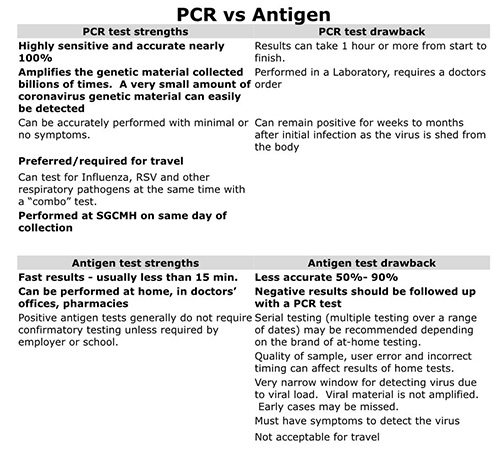STE. GENEVIEVE — In March and April, it looked like Ste. Genevieve had pretty well “flattened the curve” for COVID-19, but over the last week or so, Ste. Genevieve, and the entire state of Missouri, has become somewhat of a hot spot.
“We’re having another mini surge of COVID in our community and throughout Missouri,” said Dr. Matthew Bosner, Chief of the Medical Staff and Director of Cardiology at Ste. Genevieve County Memorial Hospital (SGCMH). “In fact, Missouri had the highest amount of new COVID cases in the last month, which is distressing. Within the last month or two, we had very few reported COVID cases, but in the last 2-3 weeks, we’ve had 20-30 new COVID cases reported. A lot of people are doing home testing and we don’t even have that data, so the number of cases could be higher.”
SGCMH has reinstated its mask mandate, but Dr. Bosner said it’s more of a precaution and shouldn’t be considered overly alarming.
Once the COVID numbers decrease, the hospital will lift the restrictions.
“Masks are always a good idea when you don’t know if the people around you have been fully vaccinated, like the grocery store, large sporting events, graduations, etc.,” he said. “It’s a good protective measure as well as making sure you are up to date with your COVID vaccination status. You can go to the health department or talk to your medical provider about getting vaccinated.”
Dr. Bosner wanted to clarify that the COVID vaccination doesn’t necessarily prevent the virus, but it will lessen its severity.
“The benefit is your body has seen the virus before and when you are exposed to it, it may not be strong enough and that’s why you may still get COVID,” he explained. “What we’re seeing is the number of hospitalizations and deaths going down significantly. So, it appears that individuals who are getting COVID at this period of time have milder cases.”
Symptoms of COVID are still the same, regardless of the variant: Fever or chills; cough; shortness of breath or difficulty breathing; fatigue; muscle or body aches; headache; new loss of taste or smell; sore throat; congestion or runny nose; nausea or vomiting; or diarrhea.
“It’s very important to discuss with your provider if you have any of these symptoms, so that a treatment plan can get underway as soon as possible,” Dr. Bosner said. “If you do test positive, especially in the first five days and you still have symptoms, that’s a good indication to get treatment with specific medications, which are in pill form, and can be prescribed by your provider.”
There are two types of tests for COVID-19: the PCR test and the antigen test. Shelly Nortin, Director of Lab Services at SGCMH, explained the difference between them.
“The PCR (Polymerase chain reaction) tests for the presence of the actual virus’s genetic material or its fragments as it breaks down,” she said. “PCR is the most reliable and accurate test for detecting active infection, and typically takes several hours to perform. The antigen test detects bits of proteins on the surface of the virus called just that– antigens. Antigen tests take only 15 to 30 minutes but are most accurate if used within a couple of days of the start of your symptoms, which is when the largest amount of virus is present in your body.”
Nortin also explained why the PCR test is most accurate.
“Because the PCR test is so sensitive, it can detect very small amounts of virus material,” she said. “This means that the test can continue to detect fragments of SARS-CoV-2 virus even after you’ve recovered from COVID-19 and are no longer contagious. Therefore, you may continue to test positive if you’ve had COVID-19 in the distant past, even though you can’t spread the virus to others.
“When a person is symptomatic or has a lot of virus in their system, antigen tests are very accurate. However, when a person is in the early stages of infection, not a lot of virus is in the nose and throat, from which the samples are taken. So, antigen tests can miss early cases of COVID. It’s also during this stage that a person has no symptoms, so they are more likely to be unaware they’re infected.”

How long COVID will hang around is anyone’s guess, but Dr. Bosner says it will likely be with us for some time.
“I think what’s going to happen is that there will be more variants that come and go, but they should be relatively mild because 65-75% of the population has been vaccinated,” he said. “What we’re hoping in the years to come, is the COVID vaccine will be included as part of your flu shot.”
Dr. Bosner couldn’t emphasize enough the importance of getting the initial COVID vaccine and following up with one or more boosters depending on your age and health status.
“It’s an ever-changing field and it’s very important to keep informed,” he said. “Contacting your provider, who knows your health very well, and having an open discussion is key to maintaining health in all aspects of your life.”
Ste. Genevieve County Memorial Hospital is a nonprofit county owned community hospital that works to continue to improve the health and well-being of the community. Our professional staff uses advanced technology and medicine to provide excellent, personalized, and compassionate healthcare.
For more information on Ste. Genevieve County Memorial Hospital, visit www.stegenevievehospital.org
